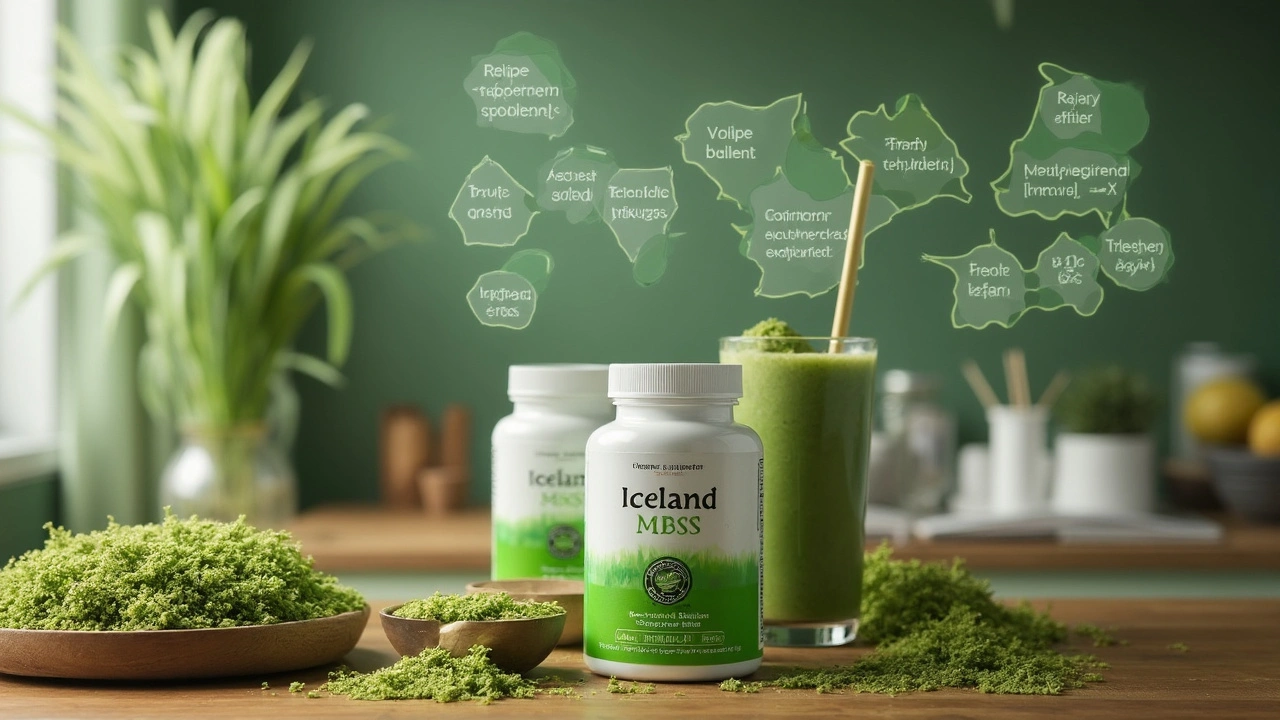Most folks see the word “moss” and picture something soggy stuck to a rock. But Iceland moss is a game changer in the world of natural supplements. It’s actually more of a lichen that grows in the wild landscapes of Iceland and Scandinavia, surviving some of the harshest climates on earth. So, what makes it so interesting for your daily health? It all comes down to the way it supports your gut, boosts your immunity, and even helps with annoying sore throats.
Not only have people in Iceland used it for centuries, but the stuff is now getting a second look by scientists who want safer, cleaner ways to help our bodies work better. There are even studies showing how Iceland moss can soothe the stomach lining and curb coughs without knocking you out like some over-the-counter meds.
Curious whether it actually tastes gross or how you’re supposed to use it? It’s easier than you think—mix it into smoothies or make a simple tea. You don’t need weird equipment, and it fits right into all sorts of routines, even if you’re a busy parent or always on the run.
- What Is Iceland Moss—and Why Is It So Popular?
- How Iceland Moss Benefits Your Body
- Best Ways to Use Iceland Moss Every Day
- Smart Tips for Buying and Storing Iceland Moss
What Is Iceland Moss—and Why Is It So Popular?
First things first: Iceland moss isn’t like the fuzzy green stuff on shady tree trunks. It’s actually a lichen—think of it as a tight partnership between fungus and algae—that survives in the wind-swept lands of Iceland, Greenland, and northern Europe. Vikings and native Icelanders figured out long ago this stuff wasn’t just for the sheep; they used it to keep their bellies calm during harsh winters.
Fast forward, and now Iceland moss is popping up on supplement shelves everywhere. Why? It’s packed with natural starches, a healthy dose of fiber, and unique compounds called lichenins and isolichenins. These aren’t just for show: Iceland moss has a natural ability to coat and soothe the lining of your gut and throat, which is a huge deal if you get acid reflux, coughs, or indigestion.
Here’s where it gets interesting. Long before gut health was trending on Instagram, Icelanders were using this lichen as a meal thickener, cough syrup base, and even bread flour in tough years. It’s gentle on sensitive stomachs and is gluten-free, making it a rare win for people with food allergies or celiac.
Ever wonder why it’s getting hyped now? The modern popularity comes from two big trends: First, more folks want plant-based, old-school remedies instead of synthetic additives. Second, scientists are finally starting to test what folks in Iceland already knew. Some small clinical trials hint Iceland moss can reduce throat irritation faster than some commercial lozenges, and it’s showing up in herbal cough teas sold across Europe.
If you like hard numbers, check this out:
| Key Nutrients in 10g Dried Iceland Moss | Amount |
|---|---|
| Dietary Fiber | ~6g |
| Lichenins / Isolichenins | ~4g |
| Protein | ~1g |
So, the next time you hear “Iceland moss,” think less about mossy rocks and more about a natural, time-tested addition to your supplement lineup. People want cleaner, natural ways to feel better, and this tough lichen is finally getting the attention it deserves.
How Iceland Moss Benefits Your Body
Alright, here’s the real deal on why Iceland moss belongs in your nutrition game. This isn't some weird plant fad. It’s got clear, solid perks for your body—ones you’ll actually notice.
First, Iceland moss stands out because it’s packed with fiber. That means it helps move things along in your gut and keeps your digestion on track. If you have a sensitive stomach, you're looking at a natural way to calm things down. Folks have used it for years to ease everything from acid reflux to heartburn and even mild constipation. One European study in 2021 found that people with chronic stomach issues had fewer symptoms after taking Iceland moss extract for a couple of weeks.
The lichen is also high in something called lichenin and isolichenin—these act like a soft gel that coats irritated tissues in your throat and gut. When you’re coughing nonstop or struggling with a scratchy throat, Iceland moss can act as a soothing shield. No wonder you’ll see it in a ton of European cough lozenges and syrups.
Don’t sleep on its immune perks, either. Iceland moss comes with natural compounds that can help your body fight off germs. There’s a small but promising study from Finland that showed adults using Iceland moss supplements caught fewer colds during winter compared to a group that didn’t.
Curious about what's actually inside a typical serving? Here’s a quick look:
| Nutrient | Per 10g Dried Iceland Moss |
|---|---|
| Dietary Fiber | ~7g |
| Polysaccharides (lichenin, isolichenin) | ~2.5g |
| B Vitamins | Small amounts |
| Beta-Carotene | Trace |
To recap, if you’re looking for a natural way to care for your gut, calm your throat, and keep your immune system on track, Iceland moss is a legit choice. And you’re not chugging down something synthetic—you’re using a supplement people have trusted for generations, with real science to back it up.

Best Ways to Use Iceland Moss Every Day
When it comes to adding Iceland moss to your daily routine, you’ve got more options than you might think. It’s versatile and actually pretty easy to work with—way easier than some complicated supplement powders or trendy ingredients.
The classic approach? Brew it into a tea. All you need is a tablespoon of dried Iceland moss, some hot water, and patience. Let it steep for 10–15 minutes. This tea has a mild, earthy flavor and is popular for calming down an upset stomach or soothing a scratchy throat. Lots of people in Nordic countries drink it during cold season for its natural immune boost.
Not a tea fan? No worries. You can sneak Iceland moss into smoothies. Just buy it as a powder—most health stores sell it like this now—and toss in a teaspoon when you blend your favorite fruits. It doesn’t overpower the taste, so you still get the benefits without any weird aftertaste. Some people stir the powder directly into soups or stews, which is an easy hack if you want to bulk up the nutrition in your comfort food.
- Dried strips: Add to bread or muffins for a boost of fiber.
- Cough remedy: Simmer in water with honey to make a natural throat syrup.
- Capsules: For people who hate the taste or just want something quick, capsules are an easy way to get your daily dose.
Here’s the thing: Iceland moss is rich in lichenin and isolichenin—two types of fiber and carb that your belly likes. According to a small Scandinavian study, folks who took Iceland moss daily had fewer stomach complaints and felt less sluggish. That’s not a miracle, but it’s a big win for something so simple.
If you’re just starting out, aim for 1–2 grams a day (that’s about a teaspoon of dried moss or powder). Go easy at first—your system wants to adjust. Don’t go overboard, since large amounts could be tough for sensitive guts.
Tip: To keep things fresh, store your Iceland moss in a cool, dry place—an airtight jar in the pantry does the trick. That way, you always have some handy for your next cup of tea, smoothie, or soup.
Smart Tips for Buying and Storing Iceland Moss
If you’re ready to try Iceland moss as a dietary supplement, you want to make sure you’re getting the real deal. The best stuff is wild-harvested, not grown in a lab. When you’re shopping, look for options that are labeled as wild or sustainably harvested from Iceland or northern Europe. Pay attention to whether it's dried and how it's processed—steam-dried moss keeps more of its good stuff than moss that’s been cooked for a long time.
Check the color: quality Iceland moss usually has a pale green or gray-green tint, not brown or faded. Smell it if possible—it should have a fresh, earthy scent, not anything musty or sour. Avoid products with additives or fillers. Pure Iceland moss should just list "Cetraria islandica" on the label. Powder and dried whole forms are most common and both work fine in teas, smoothies, or homemade capsules.
Once you’ve got your moss, keeping it fresh is easy but important. Dried moss can last for over a year if you store it right:
- Use an airtight jar or resealable bag. Oxygen and moisture are the enemies here.
- Keep it in a cool, dry place—think pantry shelf, not next to your stove or in a steamy bathroom cabinet.
- Don’t let it get direct sunlight; that kills the nutrients fast.
If you go for capsules or powder, check the expiration date on the package. Most quality brands print a “best by” date that’s at least 12–24 months out from packing.
Here’s a quick glance at ways to spot and store the best Iceland moss:
| What to Look For | Why It Matters |
|---|---|
| Wild-harvested, Iceland/Nordic origin | Higher quality and authentic benefits |
| Pale green/gray-green color | Shows freshness and correct species |
| Airtight storage | Prevents spoilage and loss of potency |
| Cool, dry, dark location | Keeps nutrients stable for longer |
Follow these tips and your Iceland moss can stay fresh and potent for a good long time, always ready when you need a healthy boost.



Alright, so Iceland moss is being called the next big thing in supplements? Honestly, I’m a bit skeptical whenever something suddenly gets the hype like that. I've been through my fair share of so-called miracle supplements that promised the world and delivered nothing.
But I can’t deny that lichen has a long history of medicinal use, so it’s not entirely out of left field. I do wonder about how exactly it impacts gut health though. Are we talking probiotics, or more like soothing properties for inflammation?
Also, the idea that it can calm a scratchy throat is interesting. Wasn’t aware it could be consumed that way without any processing. Does anyone here have firsthand experience adding it to food or drinks? Honestly curious if it’s a flavor enhancer or something that needs to be masked completely.
Finally, the article mentions clever ways to include it in your routine—does that mean teas, capsules, or something else entirely?